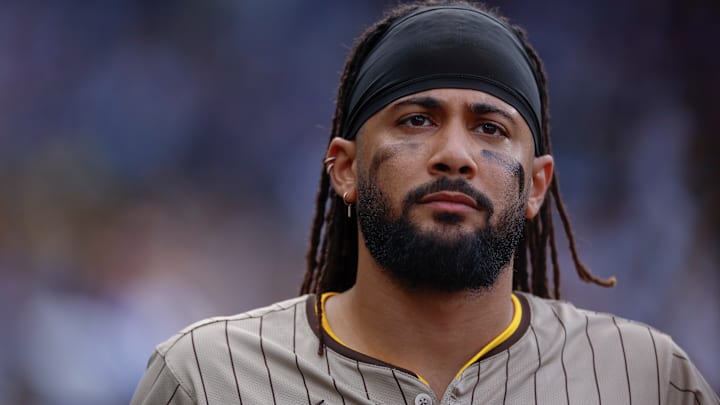MLB's Awards Week came to a conclusion on Thursday night, and the entire baseball world is still relitigating the controversial decision to name New York Yankees outfielder Aaron Judge AL MVP over Seattle Mariners catcher Cal Raleigh. (My personal stance? Both players are awesome, both had valid arguments depending on how you choose to define Most Valuable Player and we should all stop pretending that anyone we disagree with must necessarily be operating out of bad faith or East Coast bias.)
But while Judge vs. Raleigh threatened to tear the BBWAA apart, at least we're secure in the knowledge that there was no wrong answer; no matter which side of the debate you land on, it's hard to argue that the other guy wasn't worthy in his own right. So, instead, let's save our outrage for the other honor the league handed out on Thursday night — because some of the choices for the All-MLB teams are downright baffling.
For more news and rumors, check out MLB Insider Robert Murray’s work on The Baseball Insiders podcast, subscribe to The Moonshot, our weekly MLB newsletter, and join the discord to get the inside scoop during the MLB season.
Fernando Tatis Jr., Cristopher Sanchez highlight outrageous All-MLB snubs
The All-MLB teams were created back in 2019, as a means of honoring the best players in baseball who may not have meaningfully factored into the MVP or Cy Young conversations. (Why it took the league so long to do something that the NBA and NFL have done for decades is another question entirely.)
It's a pretty straight-forward idea: There's a first team and a second team, each of which include one catcher, one first baseman, one second baseman, one shortstop, one third baseman, one DH, three outfielders (regardless of specific outfield position), five starting pitchers and two relievers. The idea is to reward the best players in baseball at those positions, with only contributions during the regular season considered. (The selection process is divided between fans and a panel of baseball experts, each of which compromise 50% of the total vote.)
Both the first- and second-team rosters were unveiled after the MVP announcements on Thursday, and ... well, let's just say I have some questions. Here are some of the most egregious omissions, arranged in no particular
OF Fernando Tatis Jr., San Diego Padres
The first-team outfield included Aaron Judge, Julio Rodríguez and Juan Soto — hard to have any serious quibbles with that group, even though I might personally have advocated for Corbin Carroll over Rodríguez or Soto based on his excellent all-around play. The second team, though, is where things get wild, with Carroll, Pete-Crow Armstrong and ... Cody Bellinger? Seriously?
I'm struggling to figure out what the argument is for Bellinger over Tatis Jr. Heck, Tatis should be far closer to a first-team selection than he is to missing both rosters entirely: His 6.1 fWAR ranked third among all qualified outfielders this season. Bellinger was excellent for the Yankees, but while he matched Tatis' .814 OPS, he did so while doing just about all of his damage in a far friendlier hitting environment. His production fell off a cliff when he went on the road, whereas Tatis Jr. produced despite battling the spacious confines of Petco Park 81 times.
The underlying metrics tell us that Tatis Jr. was a substantially better hitter than Bellinger this year, and his wRC+ was six points higher (131 vs. 125). Add to that the fact that he's a Platinum Glove-caliber right fielder, and this shouldn't even be a discussion.
SP Cristopher Sanchez, Philadelphia Phillies
Someone's going to have to explain this one to me. Tarik Skubal, Paul Skenes and Garrett Crochet were all slam-dunk choices for the first-team rotation, but how did Sanchez fall behind Yoshinobu Yamamoto and Max Fried? Remember, we're only considering regular-season performance here, and during the regular season Sanchez basically matched Yamamoto's ERA (2.50 vs. 2.49) while posting a better K%-BB% differential in 28.1 more innings — basically four or five extra starts.
Fried, on the other hand, was worse than Sanchez in just about every meaningful category, from ERA (2.86 to 2.50) to K/9 to innings pitched. Sanchez was one of the five best starters in baseball this season, full stop, and I have no idea how he wasn't awarded as such.
SS Geraldo Perdomo, Arizona Diamondbacks (really, any number of NL shortstops)
Pour one out for Perdomo. He put together one of the very best seasons of any position player in the sport, but because it was so unexpected — and wasn't enough to keep the Diamondbacks from selling at the trade deadline — it feels like hardly anyone noticed or cared.
We'll say it, though: How on Earth did Bo Bichette earn second-team shortstop honors ahead of not just Perdomo but a slew of National League stars, from Francisco Lindor to Trea Turner? Sure Bichette, was a slightly better hitter than either of those last two, but Lindor and Turner were two of the best defensive shortstops in the sport while Bichette was one of the worst. And Perdomo led all qualified players at the position, all while playing well above average defense. Bichette got lapped in fWAR, finishing 10th among shortstops; it feels like he was rewarded for the Blue Jays' run to Game 7 of the World Series, but again, that's not what we're supposed to be doing here.
